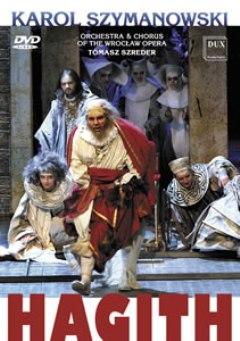Karol Szymanowski - Hagith (Tomasz Szreder)
Karol Szymanowski - Hagith (Tomasz Szreder)

1. Scena I 2. Scena II 3. Scena III 4. Scena IV – Powrot (Back) Adam Zdunikowski – tenor Wioletta Chodowicz – soprano Viktor Gorelikov – bass Taras Ivaniv – tenor Maciej Krzysztyniak – baritone Choir and Orchestra of The Wroclaw Opera Tomasz Szreder – conductor
It was in 1912 that Szymanowski made the first sketches of his one-act opera Hagith, a work dedicated to Prince Władysław Lubomirski, who supplied him with the libretto by his friend, Vienna-based writer Felix Dörmann. The score was ready in October 1913, yet the first performance did not take place until nine years later. On 13th May 1922 the opera, based on the Biblical story of King David (Old King) and the girl Abishag (Hagith), was performed at the Warsaw Grand Theatre, with Maria Mokrzycka, Ignacy Dygas and Stanisław Gruszczyński in solo parts and Emil Młynarski conducting.
The style of Hagith is that of German Expressionism, and there is a particular kinship with the music of Richard Strauss and his Salome, a fact pointed out by Szymanowski himself in a letter to Stefan Spiess: "I have found out that had I had an adequate libretto, I would feel an affinity with this opera. Unfortunately 'Hagith' runs absolutely contrary to my views and ideals, so I often adopt Strauss's style, something I find very upsetting."1
Szymanowski, who at the time of writing Hagith was already leaning towards new ideas and new style (he was sketching his 3rd Symphony 'Song of the Night' in the summer of 1914), clearly felt his opera a burden, what with its complicated, dissonant harmony, thick orchestral texture, expressiveness and drama. Hagith's piano score was published by Vienna's Universal Edition in 1920. No recording of the opera has ever been released, however, although the archives of the Polish Radio have recordings of two productions done in Katowice: one a radio adaptation from 1964, the other a Polish Television production from 1972. Both feature Teresa Gryboś, Roman Węgrzyn and Wiesław Ochman and the Warsaw Symphony Orchestra of the Polish Radio (WOSPR) under Kazimierz Kord. --- Anna Iwanicka-Nijakowska, culture.pl
This seems to be the only version of "Hagith" available at the moment. I cannot recall it being available in any form prior to this dvd issue of a live performance by The Wroclaw Opera. The principal singers are all possessed of strong voices (they need to be in order to rise above Szymanowski's often dense orchestral counterpoint) and one or two have a tendency to be strident; however this is probably the sort of timbre the composer had in mind and, as such, must be considered authentic.
The production has some oddities about it; costumes and sets suggest something vaguely 16th century (although I would guess the opera is meant to take place in a period considerably earlier) but the "props" include cigarettes and a lighter, a hypodermic syringe and a wheelchair....Why?? The music shows the influence of Strauss' Salome and the plot (apparently Szymanowski's own) is equally unpleasant; the old king is dying and unjustly accuses his son of desiring his death. A young maiden, Hagith, is brought to the palace in order to give the king a new lease of life by sleeping with him but she meets the young prince, who she's had her eye on for some time, and the two fall in love in the space of about five minutes warbling. When the time comes for her to do her duty by the king (who ain't a pretty sight) Hagith, not unnaturally, declines. The king attempts to rape her and expires from all the excitement. Hagith is then stoned to death for refusing to carry out orders and the late king's son appears on stage at the end of the opera just too late to rescue his adored one. If there is some deeper meaning to all of this I have, so far, failed to fathom it.
Anybody unfamiliar with Szymanowski's music would be advised to investigate "King Roger" - a much more rounded and successful opera than "Hagith" - rather than acquiring this dvd. However, although I cannot recall hearing the work before, I must say that the music interested me enough on this acquaintance to make me want to return to it in the near future and to get to know it better, so I would recommend this issue to any admirers of Szymanowski's music who might be considering its purchase. --- Israel Iskowitz, amazon.com
Napisana w latach 1912-1913 Hagith wyrasta jeszcze całkowicie z ducha niemieckiego ekspresjonizmu, atmosferą zbliżając się najbardziej do Straussowskiej Salome. Szymanowski poszedł tu jednak dalej od Straussa, jeżeli idzie o skomplikowanie harmoniki i zagęszczenie faktury instrumentalnej oraz nasilenie nieprzerwanego emocjonalnego napięcia.
Być może te właśnie względy, przy pewnym braku doświadczenia młodego kompozytora, oraz fakt wybrania za tło libretta drastycznego tematu z biblijnej Księgi Królów – sprawiły, że opera Szymanowskiego nie zdobyła sobie sukcesu i popularności na które, projektując jej napisanie, liczył kompozytor.
Mimo usiłowań nie udało się wprowadzić Hagith na scenę wiedeńską, a wystawiona po wojnie w Warszawie nie utrzymała się w repertuarze. Wiosną 1962, w 25-lecie śmierci Karola Szymanowskiego, wznowiła ją Państwowa Opera Śląska, a w 1964 –Teatr Muzyczny w Krakowie. --- opera.wroclaw.pl
download: uploaded anonfiles mega 4shared mixturecloud yandex mediafire ziddu








